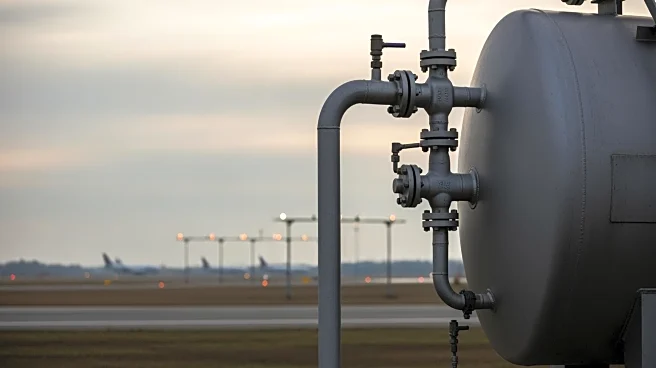What's Happening?
Seattle-Tacoma International Airport (SEA) is experiencing a disruption in its jet fuel supply due to a leak in the Olympic Pipeline, which is owned by BP. The pipeline was shut down following the discovery
of the leak during routine maintenance on November 11. As a result, airlines operating at SEA, including Alaska Airlines and Delta Air Lines, are taking measures to mitigate potential flight disruptions. Alaska Airlines, which holds a 50% market share at SEA, is employing strategies such as tankering fuel on inbound flights and adding fuel stops to certain routes. Delta Air Lines, the second-largest carrier at SEA, has warned passengers of possible schedule adjustments for international long-haul flights. Washington Governor Bob Ferguson has issued an emergency declaration to facilitate the transportation of jet fuel to the airport via trucks.
Why It's Important?
The fuel supply disruption at SEA has significant implications for airline operations, particularly during the busy Thanksgiving travel period. Airlines are forced to adapt by implementing strategies to ensure continued service, which may lead to increased operational costs and logistical challenges. The situation highlights the vulnerability of airport fuel supply chains and the importance of contingency planning. Passengers may face inconveniences such as flight delays or schedule changes, impacting travel plans. The emergency measures taken by the state government underscore the critical nature of maintaining fuel supply to support air travel and the broader economic activities associated with it.
What's Next?
Efforts are underway to repair the Olympic Pipeline, but there is no clear timeline for when it will be operational again. Airlines will continue to monitor the situation and adjust their strategies as needed to minimize disruptions. The emergency waiver allowing trucks to transport fuel to SEA will remain in effect until the pipeline issue is resolved. Airlines are likely to maintain close communication with pipeline operators, refineries, and airport authorities to manage fuel logistics effectively. Passengers are advised to check flight statuses regularly for updates on potential schedule changes.









